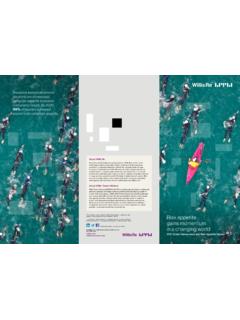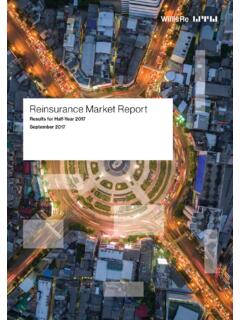Transcription of Insurance contract accountIng: edgIng towards a …
1 Insurance contract accounting : edgIng towards David Simmons Managing Director a Global Standard Willis Analytics Tel: +44 (0)20 3124 8917 October 2010. Email: Angela Bowern Divisional Director Willis Re International Tel: +44 (0)20 3124 7843. Email: Adrian Hammond Executive Director Willis Market Security Tel: +44 (0)1473 223 329. Email: Global and local reinsurance Willis Re employs reinsurance experts worldwide. Drawing on this highly professional resource, and backed by all the expertise of the wider Willis Group, we offer you every solution you look for in a top tier reinsurance advisor. One that has comprehensive capabilities, with on-the-ground presence and local understanding. Whether your operations are global, national or local, Willis Re can help you make better reinsurance decisions - access worldwide markets - negotiate optimum terms.
2 And boost your business performance. How can we help? To find out how we can offer you an extra depth of service combined with extra flexibility, simply contact us. Begin by visiting our website at or calling your local office. Willis Re Willis Re Inc. The Willis Building One World Financial Center 51 Lime Street 200 Liberty Street London EC3M 7DQ 3rd Floor Tel: +44 (0)20 3124 6000 New York, NY 10281. Fax: +44 (0)20 3124 8223 Tel: +1 (212) 915 7600. Willis Limited, Registered number: 181116 England and Wales. Registered address: 51 Lime Street, London EC3M 7DQ. A Lloyd's Broker. Authorised and regulated by the Financial Services Authority. Copyright 2010 Willis Re Inc. All rights reserved: The views expressed in this report are not necessarily those of Willis Re Inc.
3 , its parent companies, sister companies, subsidiaries or affiliates (hereinafter Willis ). This report and its contents are provided for informational purposes only, do not constitute professional advice and are not intended to be relied upon. Willis is not responsible for the accuracy or completeness of the contents herein and expressly disclaims any responsibility or liability for the reader's application of any of the contents herein to any analysis or other matter, or for any results or conclusions based upon, arising from or in connection with the contents herein, nor do the contents herein guarantee, and should not be construed to guarantee, any particular result or outcome. 1 | Willis Re Solvency II 8990/10/10 Willis Re Solvency II | 2.
4 Contents The New International Financial Reporting Standards what you need to know?..2. Global scope of IFRS for Insurance 4. Differences with Solvency 4. A new way of thinking and 4. What is the margin?..5. Deferred acquisition 6. Cash flow 6. Discounting the time value of 6. Short-duration 6. Moving from local standards to 6. Tax Other points to Having your 8. Willis Re Insurance contract accounting | 1. The New International Financial Reporting Standards what you need to know? The world is moving towards convergence in Insurance accounting standards. The latest consultation papers show that implementation is on course for 2013. The impacts could be profound, both in terms of numbers produced and the organisational impact upon companies, particularly those in Europe already struggling with regulatory change.
5 What are the key facts and potential consequences for insurers and Insurance professional? 2 | Willis Re Insurance contract accounting Background In 2008, the 's Financial accounting Standards Board (FASB) joined the London-based International accounting Standards Board's (IASB) project to develop a new Insurance accounting standard. The aim is to finalise the new standard in 2011 for likely implementation in 2013. Time Line 1997 to 2004 IASB develop a IFRS for Insurance contracts 2004 Phase 1, IASB issue IFRS 4: Insurance contracts 2005 EU listed companies required to prepare consolidated financial statements using IFRS. May 2007 Phase 2, IASB publish discussion paper November 2007 End of insurer comment period 2008 US FASB join IASB to produce one standard for Insurance contracts July 2010 IASB release Exposure Draft September 2010 FASB produce Discussion Paper November 2010 End of IASB insurer comment period December 2010 End of FASB insurer comment period 2011 Final Standard 2013 Proposed first implementation Figure 1: Timeline for implementation The new standard will replace the interim IASB standard, But the proposals are not finalised.
6 There are differences an International Financial Reporting Standard (IFRS) 4 and between the IASB and FASB and differences between both GAAP. and the developing Solvency II approach. Listed EU companies are required to prepare their This paper aims to give an overview of the proposed changes consolidated financial statements under IFRSs and a number and their impacts, aimed at an Insurance /reinsurance of other countries including Singapore and Hong Kong have professional without an accounting background or a prior also adopted IFRS. Similarly other countries base their knowledge of the topic. The paper is deliberately non-technical. accounting standards wholly or in part on GAAP. If you find you wish to learn more or discuss any aspect of the proposals please do not hesitate to contact us.
7 Many major economies, including Japan, Korea, India, Brazil, Canada and Mexico have announced that they will adopt the The differences with existing standards are startling and new IFRS standard. the implications huge, particularly if moving from a local standard with very different rules on reserving. The likely In July 2010 the IASB produced their latest consultation paper implementation date is right in the middle of Europe's on phase two of the new standard, the Insurance Contracts Solvency II implementation process, a process being Exposure Draft (ED). In September 2010 the FASB produced shadowed in a number of other territories around the world. a Discussion Paper (DP) on the new standard. Responses to The additional workload on companies will be considerable these documents are due by the end of November and but the benefit should be, at last, comparable Insurance mid-December respectively.
8 Accounts from around the world. Willis Re Insurance contract accounting | 3. Global scope of IFRS for Insurance contracts IFRSs by Jurisdiction IFRS Allowed IFRS Mandatory IFRS Not Allowed Transitioning to IFRS Not Known / Not Applicable Figure 2: IFRS for Insurance contracts for listed companies (based upon data from a number of primary and secondary sources, given potential differences in definition it cannot be guaranteed to be definitive). Differences with A new way of thinking Solvency II and reporting The differences between accounting and regulatory rules are The proposed IFRS potentially could lead to Insurance not surprising, Solvency II is essentially aimed at ensuring accounts looking radically different to what we are used to.
9 Policyholders are protected, it considers at the 1 in 200 risk level. focusing on changes to margin rather than premiums, claims and commission. By contrast, accounting standards look at mean or average In many ways the principles are similar to those adopted in results. IASB and FASB place a premium on making sure Solvency II but there are differences; the devil is in the detail. that profits and losses are properly recognised. The building blocks of the new measurement model This means that, for example, whilst diversification is a Residual margin major issue for Solvency II for IASB/FASB it is less contract profit (reported over the life of the contract ). Risk adjustment important and not a major concern. An assessment of the uncertainty about the amount of future cash flows Time value of money An adjustment that used an interest rate to convert future cash flows in to current amounts A number of differences emerge, as we discuss below.
10 This is to be expected, both Solvency II and the IFRS are Total Insurance developing standards, it is hoped that convergence will liability grow. However, it is likely that the reconciliation of Current estimates of future cash flows The amounts the insurer expects to collect from premiums and pay out for claims, differences between IASB and FASB will have greater benefits and expenses, estimated using up-to-date information priority than between IFRS and Solvency II. Figure 3: IASB Building block proposal Source IASB. 4 | Willis Re Insurance contract accounting Insurance transactions are to be valued as follows: The accounting margins represent something very different. The expected cash flow of the contract is established.








